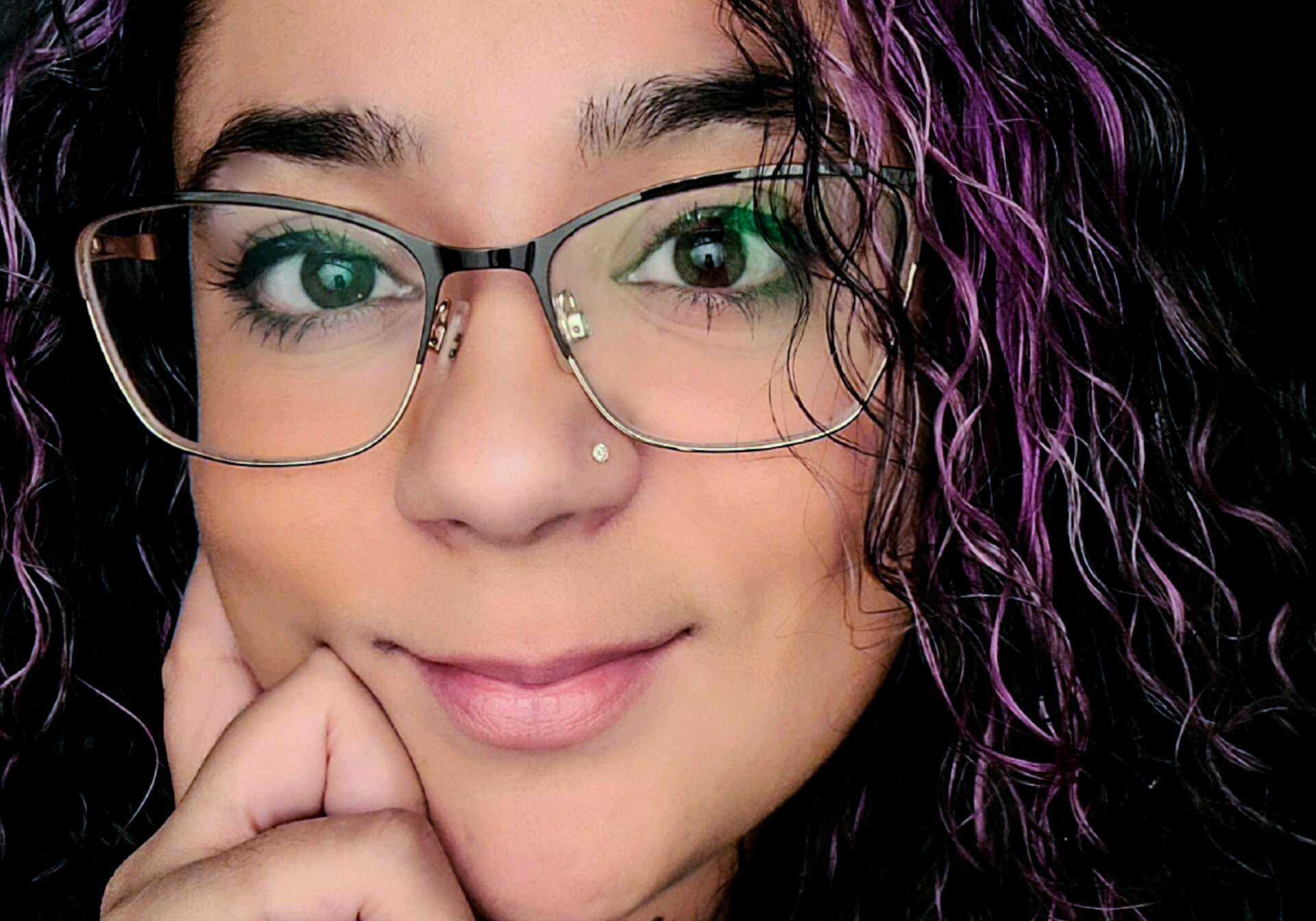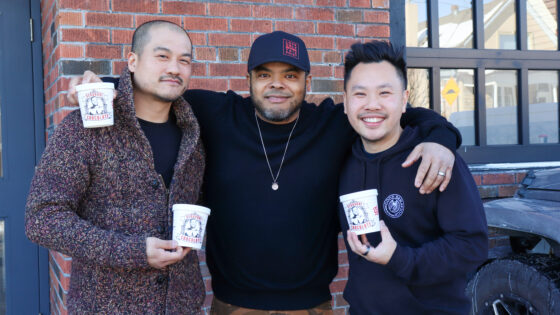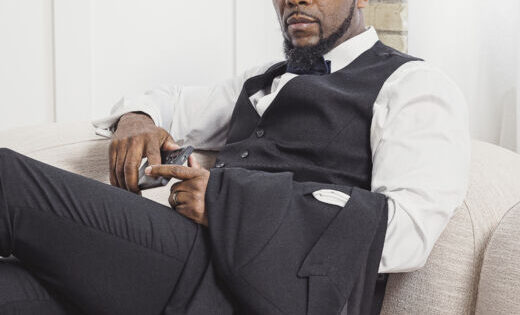on
BY JANIECE CAMPBELL
“I pride myself on integrity, having compassion for others and having empathy. As someone who’s a visible minority within being a female, there’s a weight we have to carry. I just want to represent all women in a positive light.”
Christina Leslie
Being a photographer seems fairly simple. Nowadays, everybody has easy access to a camera through their phones. With the abundance of free photo editing apps available for download, it’s almost as if anyone can give themselves the self-proclaimed job title.
After my conversation with professional photographer Christina Leslie, she proved that there’s so much more depth to the storytelling artform.
Christina Leslie, a Scarborough native, is an analog photographer and visual artist with over 20 years of experience in the industry. Earning her Bachelor of Fine Arts from the Ontario College of Art and Design University in Toronto, she is currently pursuing her Master of Fine Arts at Savannah College of Art and Design in Georgia, USA.
Unlike many other high school graduates, unsure of what the future holds as they venture into post-secondary, young Christina was ready to jump start her career at the mere age of 17. With the support of her loving father, she literally began to build her future.
“I bought myself my first 35mm SLR camera. I worked at Sears at the time and I worked overtime so that I could buy it. It cost like $400, which was really expensive back then. I convinced my father that I really loved photography and asked if he could help me make a dark room, which he did. He was super supportive of my craft at a very young age.”
Diversity is a massive focal point in her photos, which can be attributed to her family dynamic. Christina is biracial, and a lot of her inspiration is credited to her Jamaican father’s side of the family.
“I talk a lot about my biracial background. I don’t omit being white, it’s still a part of me. But I’ll admit that I connect more to my Jamaican culture just because it was such a prominent influence growing up. My father made a big habit of sharing his culture with us and taking us back home. I’ve been to Jamaica every year and I feel a connection with the community even though I’m from foreign.”
Much of Christina’s photographic practice revolves around various themes of identity, immigration, issues of marginalization, race and her Jamaican heritage. Her art has been featured in an extensive list of publications both across Canada and outside of its borders, including recently in the UK magazine MURZE in both 2019 and 2020. In April 2020, she was a part of Capture Photography Festival in Vancouver. Following that event, in May, she had a solo exhibition at Black Artists’ Network in Dialogue as part of the Scotiabank Contact Festival in Toronto.
“I’m very driven by stories primarily surrounding black identity and black representation. I focus a lot of my work around my heritage. Lately, I’m finding what’s also really driving my work is the history behind Middle Passage – the idea of power, law, black reclamation of identity and what we lost during that time. I’m heavily interested in the stories that weren’t told during the transatlantic slave trade and what our history was like before that period of time.”
No occupation on this planet is trouble-free, and photography is no exception. In her two decades and counting within the industry, Christina has faced and overcame a multitude of challenges along the way.
“Because my subject matter is centered around representation and inclusivity, I think that’s a challenge in itself. I think the visual arts landscape is still dominated by a very white European Anglo-Saxon landscape, so that’s a challenge too. I want people to find beauty and credibility in my work and I want them to share the narratives of the Caribbean and black diaspora. I also think because I’m coming from a Canadian perspective, that’s another challenge. Many people think that the artistic hub is mainly American and as a Canadian artist, it can be hard to find your way outside of this country.”
Most recently, Christina’s work is being featured at the Peel Art Gallery Museum + Archives (PAMA) located in Brampton. The Caribbean art exhibit is entitled, “when night stirred at sea,” and showcases the work of ten contemporary artists working in Jamaica, Trinidad, Canada, America and England. In the exhibit, Christina displays photos of her father’s hometown of Morant Bay, St. Thomas, Jamaica. The series provides an intimate black-and-white insight of the small town, including views of its citizens, waterfalls and even Christina’s grandfather’s home.
“Overall, the series touches on this idea of memory, encapsulating your place of origin and having appreciation for that. For those a part of the West Indian community, I would hope that they see a reflection of their own heritage. I would hope for those who may be a first generation Canadian, that they would remember some of the stories that their own parents had told them about back home,” she says.
She continues.
“On a larger scale, I would hope that Canadians who are not of West-Indian origin would still be able to recognize the importance in the celebration of diversity and sharing it. I’ve read that over 280 languages are spoken in Toronto alone, so that tells me that we’re a very diverse city. I would hope that people would look at the work and still resonate with it despite not being originally from there.”
Today, Morant Bay has a population of nearly 95,000. The town carries a heavy history, where hundreds of poor black people rebelled in 1865, protesting injustice and poverty. Classified as one of the most severe suppressions of unrest in the history of the British West Indies, the governor at the time ordered troops to arrest and supress the rebels; ultimately killing over 400, arresting over 300, and proceeding to execute or give long-term sentences to those arrested. Representing a place containing so much history in words alone can be difficult in itself, but nevertheless Christina effortlessly captures and tells a brief yet beautiful story of the town and its people over 150 years later.
“I think often times, people exploit the places that they’re photographing and don’t give credit to the community. I was trying to go there not as a voyeur, but as a participant. I think the story is showing the history of Jamaica in that small town. And if you know the history of Morant Bay, I think you’d be able to understand the different connection of the images.
Going back to the place where your parents are from is a narrative in itself. You’re going back to their original hometown and you’re able to not only experience it through your eyes but also able to experience it through the memories they might have shared with you. I think that’s an important story no matter where you’re from. It’s paying homage to a place that your parents grew up and connected to at one point in their lives.”
If it wasn’t for the COVID-19 pandemic, Christina says that she would have been working back home in Jamaica for up to six months. The pandemic halted plenty of her plans, including being able to physically be on campus at her school in the United States. Despite the lack of mobility, these past few months allowed her to remember some forgotten talents – she is a skilled painter. Earlier this year, she started her own business called BLK-T!3 (pronounced ‘black tie’), where she makes custom hand-made black tie-dye t-shirts, masks and other apparel.
You can check out Christina’s official Instagram page for BLK-T!3 at @blkt.ie or see her artistry on her personal account @clphoto83.
Stay in the loop with exclusive news, stories, and insights—delivered straight to your inbox. No fluff, just real content that matters. Sign up today!
Katrina Coombs The Autobiographical Artist













